Are you ready to develop a green thumb and master the gardening basics to know in the UK? Look no further! In this friendly guide, I will share my expertise and provide you with all the essential gardening knowledge you need for lush and vibrant gardens.
Key Takeaways:
- Understand the unique gardening climate in the UK to overcome challenges and leverage advantages.
- Equip yourself with the essential tools and equipment needed for successful gardening in the UK.
- Learn the art of soil preparation to improve soil quality and create optimal growing conditions.
- Select the right plants that thrive in the UK climate, based on plant hardiness zones and native species.
- Explore various UK gardening techniques and practices, from pruning to pest control, to ensure your garden thrives.
Understanding the UK Gardening Climate
Before diving into the world of gardening in the UK, it’s important to understand the unique climate that shapes our gardening experiences. From the mild, temperate weather to the varying regional conditions, here are some essential tips for beginners looking to start their own garden in the UK.
The UK gardening climate is known for its mild and temperate nature, thanks to the influence of the Gulf Stream. This means that the weather is generally moderate throughout the year, with mild winters and cool summers. However, it’s important to note that the climate can vary greatly depending on the region. For example, in northern parts of the UK, the weather tends to be cooler and wetter compared to the south.
When starting a garden in the UK, it’s crucial to choose plants that are suitable for the local climate. Opt for varieties that are known to thrive in the UK gardening climate, such as roses, lavender, and hydrangeas. These plants are well-adapted to the temperate conditions and will require less effort to maintain.
Additionally, consider the specific microclimate of your garden. Factors such as sunlight exposure, wind patterns, and soil type can greatly impact the success of your plants. Take note of the shady spots, windy areas, and any variations in soil quality. This will help you determine the best locations for different types of plants and enable you to create a more harmonious garden.
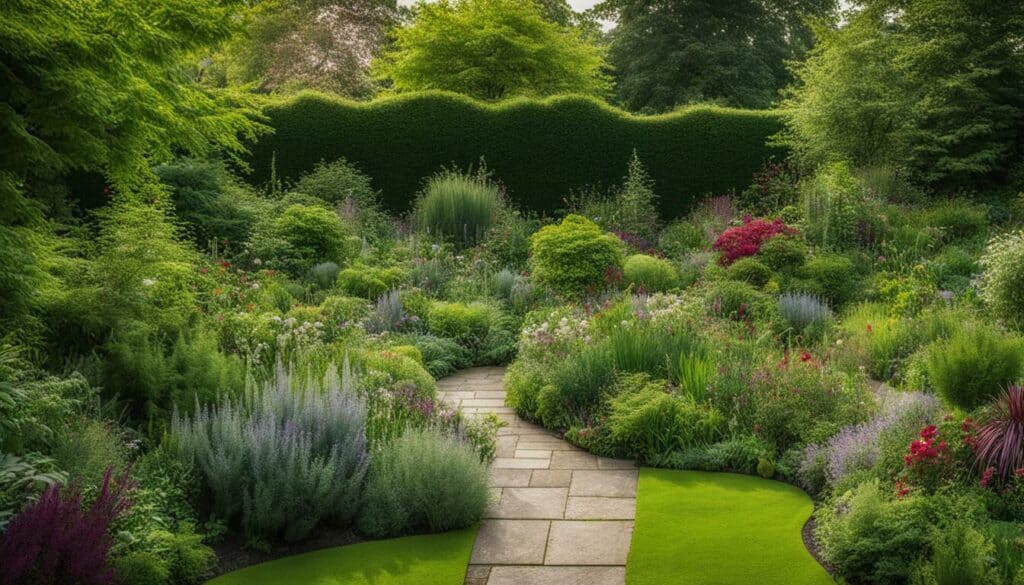
| Regional climate variations in the UK | Characteristics |
|---|---|
| Northern UK | Cooler and wetter compared to the south, longer daylight hours in summer |
| Southern UK | Milder winters and warmer summers, less rainfall |
| Coastal regions | Moderating effect from the ocean, less temperature extremes |
| Inland areas | Greater temperature differences between seasons, potential for frost |
By understanding the unique climate of the UK and considering regional variations, you’ll be better equipped to create a thriving and beautiful garden. Remember to choose plants that are well-suited to the gardening climate, and take into account the specific conditions of your garden. With these tips, you’ll be on your way to mastering the basics of gardening in the UK.
Essential Tools and Equipment for UK Gardening
As you embark on your gardening journey in the UK, having the right tools and equipment is crucial. Here’s a comprehensive list of UK gardening essentials that will help you get started and make your gardening experience more enjoyable.
Garden Tools
To maintain your garden effectively, you’ll need a variety of garden tools. Here are some must-have tools:
- Spade or shovel for digging and turning soil.
- Garden fork for loosening soil and removing weeds.
- Rake for leveling soil and clearing debris.
- Trowel for planting and transplanting small plants.
- Pruning shears for trimming bushes and small branches.
- Garden gloves to protect your hands from thorns and dirt.
| Tool | Description |
|---|---|
| Spade or Shovel | Essential for digging and turning soil. |
| Garden Fork | Loosens soil and removes weeds effectively. |
| Rake | Levels soil and clears debris. |
| Trowel | Perfect for planting and transplanting small plants. |
| Pruning Shears | Trim bushes and small branches with ease. |
| Garden Gloves | Protect your hands from thorns and dirt. |
Watering Equipment
Proper watering is essential for the health of your plants. Make sure you have the following watering equipment:
- Watering can or hose with a spray nozzle for watering plants.
- Watering wand for reaching hanging plants and containers.
- Irrigation system or drippers to automate watering.
| Equipment | Description |
|---|---|
| Watering Can or Hose | Essential for watering plants. |
| Watering Wand | Reaches hanging plants and containers. |
| Irrigation System | Automates watering for convenience. |
Don’t forget to invest in quality tools and equipment to ensure their durability and effectiveness. With these UK gardening essentials, you’ll be well-equipped to create a beautiful and thriving garden.
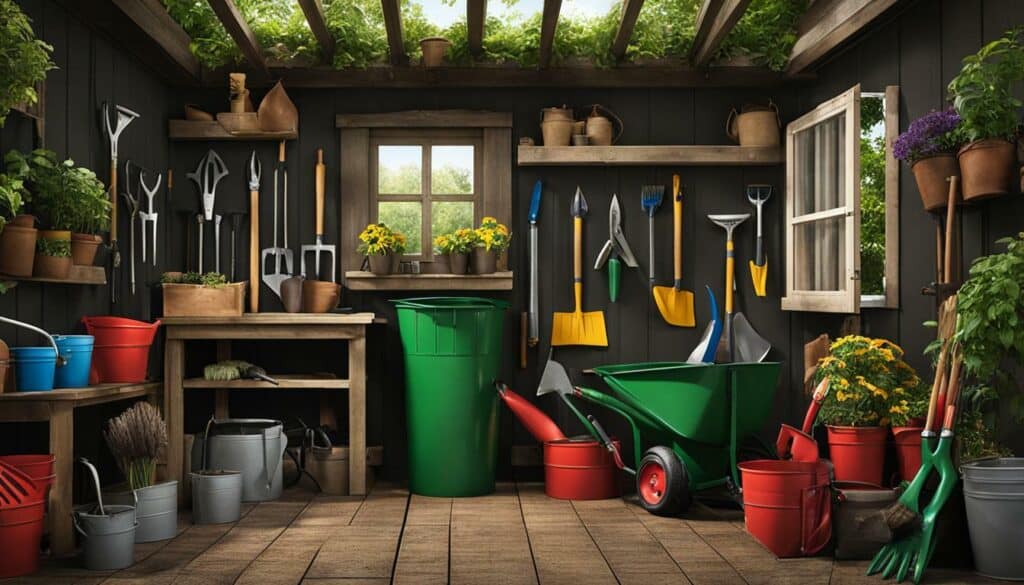
The Art of Soil Preparation in UK Gardens
Healthy soil is the foundation for successful gardening in the UK. In this section, I’ll guide you through the art of soil preparation, helping you understand the different soil types in the UK and providing useful tips to improve your soil quality. Good soil structure and nutrient content are essential for strong plant growth and a thriving garden.
When it comes to UK soil, there is a wide range of types, including clay, loam, and sandy soil. Understanding the characteristics of each soil type is crucial, as it affects drainage, water retention, and the availability of nutrients. Using a simple soil testing kit, you can determine the pH level and nutrient content of your soil, enabling you to make informed decisions about its improvement.
“Soil testing is a valuable tool for gardeners,” says Dr. Green, a renowned horticulturist at the University of Minnesota Extension.
“It allows you to identify any deficiencies or imbalances so that you can tailor your soil amendments accordingly.”
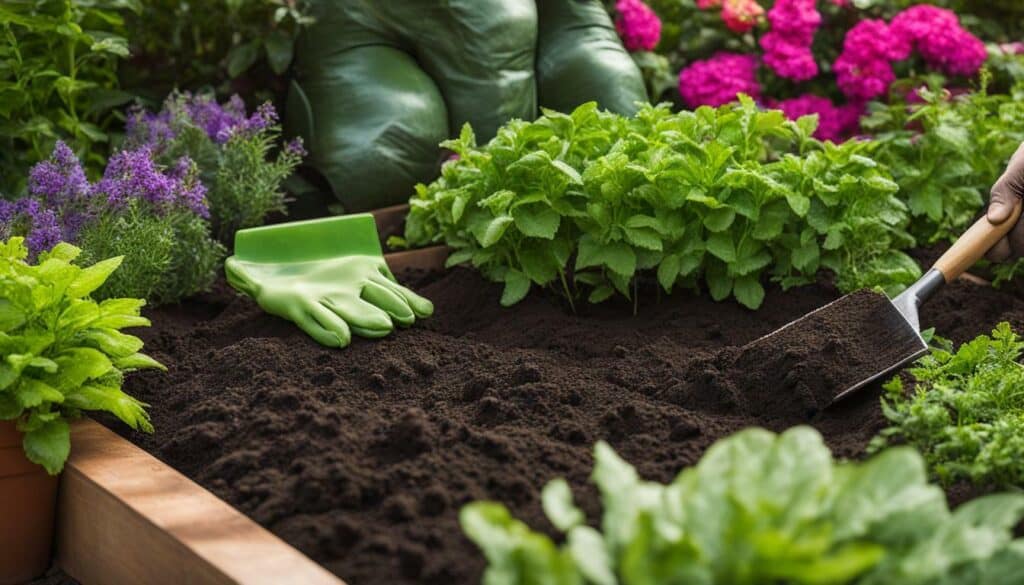
By adding organic matter, such as compost or well-rotted manure, you can enhance the soil structure, increase fertility, and improve moisture retention. Additionally, incorporating mulch into the soil helps to suppress weeds, retain moisture, and regulate soil temperature.
To summarize, proper soil preparation is key to successful gardening in the UK. By understanding your soil type and making necessary amendments, you can create an environment where plants can thrive. Take the time to test your soil, address any imbalances, and incorporate organic matter to improve its quality. With healthy soil as your foundation, your garden will flourish and reward you with bountiful blooms and delicious produce.
Choosing the Right Plants for UK Gardens
Selecting the right plants for your UK garden is vital for their success and longevity. In this section, I’ll share valuable insights into plant hardiness zones, native plants, and provide tips to help you choose the ideal plants for your UK garden.
Plant Hardiness Zones
Understanding the plant hardiness zones in the UK is essential when selecting plants for your garden. These zones are determined by climate conditions and indicate the suitability of certain plants for specific regions. The UK is divided into several zones, ranging from Zone 8 in the south to Zone 3 in the north. Knowing your zone will help you identify plants that are more likely to thrive in your local climate.
When choosing plants, consider their hardiness rating and match it with your zone. This will increase their chances of survival and ensure they can withstand the typical weather conditions in your area. Consult with local nurseries or gardening experts for recommendations on plants that are well-suited to your specific zone.
Native Plants
Introducing native plants to your UK garden is a great way to create a sustainable and eco-friendly landscape. Native plants are adapted to the local climate and require less maintenance, as they are already acclimated to the region’s weather patterns and soil conditions. They also provide a habitat for local wildlife, attract pollinators, and enhance biodiversity.
Consider incorporating a variety of native plants into your garden design. Research different species that are native to your area and choose those that align with your garden’s specific needs and aesthetics. Native plants not only contribute to the overall health of your garden but also help preserve the natural balance of the UK’s ecosystems.
Tips for Choosing Plants in the UK
When selecting plants for your UK garden, there are a few additional factors to consider:
- Soil type: Different plants thrive in different soil conditions. Test your soil and choose plants that are well-suited to its composition. For example, acidic soil may be more suitable for ericaceous plants like rhododendrons, while alkaline soil may suit lavender or roses.
- Sun exposure: Assess the amount of sunlight your garden receives throughout the day. Some plants require full sun, while others prefer partial shade or full shade. Choose plants that will thrive in your garden’s specific light conditions.
- Water requirements: Consider the water needs of plants before adding them to your garden. Some plants are drought-tolerant and require minimal watering, while others need consistent moisture. This will help you plan your watering schedule accordingly.
By considering these factors and researching the specific needs of plants, you can create a well-balanced and thriving garden in the UK. Remember to choose plants that you personally enjoy and that will complement the overall look and feel of your outdoor space.
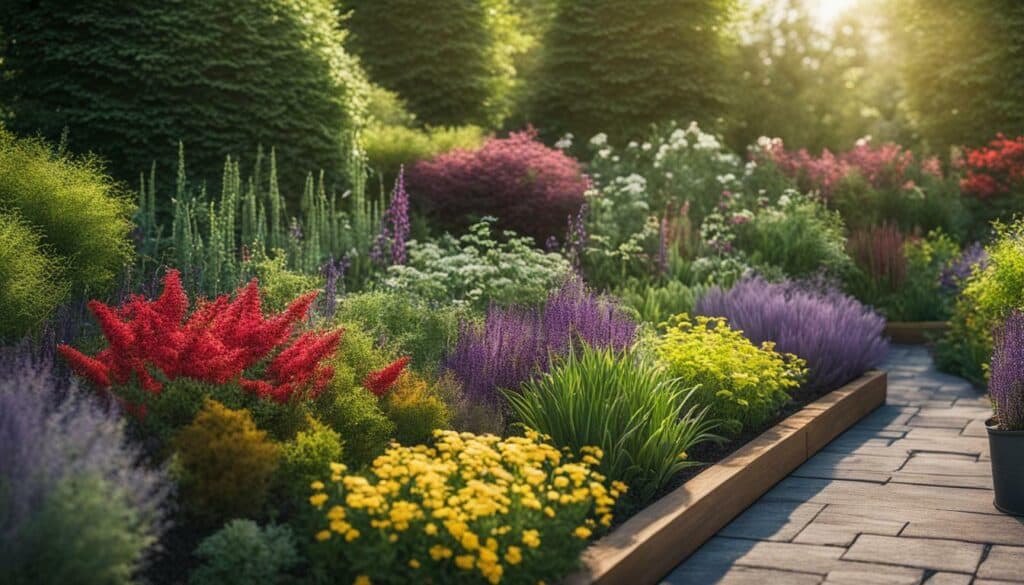
| Zone | Temperature Range (°F) | Hardiness |
|---|---|---|
| Zone 3 | -40 to -30 | Very Cold |
| Zone 4 | -30 to -20 | Cold |
| Zone 5 | -20 to -10 | Cool |
| Zone 6 | -10 to 0 | Mild |
| Zone 7 | 0 to 10 | Moderate |
| Zone 8 | 10 to 20 | Warm |
Understanding the hardiness zones and considering factors like native plants, soil type, sun exposure, and water requirements will guide you in selecting the right plants for your UK garden. By following these tips and taking into account your specific zone and garden conditions, you’ll create a vibrant and thriving outdoor space that brings you joy for years to come.
UK Gardening Techniques and Practices
Now that you have the basics covered, it’s time to delve into the specific gardening techniques and practices that are essential for success in the UK. From proper pruning techniques to effective pest control, this section will equip you with the knowledge to master UK gardening.
Pruning Guide for Healthy Plants
Pruning is an important practice in maintaining the health and appearance of your garden. It involves removing dead or damaged branches, shaping plants, and promoting new growth. Here are some key tips for successful pruning:
- Start by using the right tools, such as sharp secateurs for small stems and loppers for thicker branches.
- Understand the specific pruning requirements of different plants. For example, some plants, like roses, benefit from regular pruning to encourage blooming.
- Prune during the appropriate season. Most deciduous trees and shrubs can be pruned in late winter or early spring, while flowering shrubs should be pruned after they finish blooming.
- Follow proper pruning techniques, such as making clean cuts just above a bud or node and removing any crossing branches or suckers.
By mastering pruning techniques, you can maintain the health and beauty of your plants, shaping them to enhance the overall aesthetic of your garden.
Pest Control: Keeping Your Garden Healthy
Dealing with pests is an inevitable challenge for any gardener. To protect your plants and maintain their health, it’s important to implement effective pest control strategies:
- Identify common garden pests in the UK, such as aphids, slugs, and snails. Learn their habits and the damage they can cause.
- Implement preventive measures, including maintaining good garden hygiene, promoting biodiversity, and using physical barriers like netting or row covers.
- Consider natural pest control methods, such as introducing beneficial insects, using organic sprays, or creating companion planting combinations that repel pests.
- Monitor your garden regularly and take action at the first signs of pest infestation. Prompt intervention can prevent further damage.
By staying vigilant and using effective pest control measures, you can protect your plants and maintain a healthy garden environment.
Creating a Beautiful Container Garden
Container gardening is a versatile and convenient option, particularly for those with limited outdoor space. Here are some tips for creating a beautiful container garden:
- Select the right containers for your plants, ensuring they have proper drainage holes and are suitable for the size and growth requirements of your chosen plants.
- Choose a well-draining potting mix formulated for container gardening to provide the necessary nutrients and aeration for plant growth.
- Consider the sunlight requirements of your plants and position your containers accordingly, placing them in areas that receive the appropriate amount of light.
- Regularly water your container garden, taking care not to overwater or let the soil dry out completely. Monitor the moisture levels by checking the soil regularly.
- Fertilize your container plants regularly to ensure they receive the necessary nutrients for healthy growth. Follow the instructions on the fertilizer packaging for the correct dosage and application.
With proper care and attention, your container garden can thrive and bring beauty to any space, whether it’s a balcony, patio, or doorstep.
| Technique | Description |
|---|---|
| Companion Planting | Planting certain crops together to provide benefits, such as repelling pests or enhancing growth. |
| Succession Planting | Planting new crops in intervals to ensure a continuous harvest throughout the growing season. |
| Water Conservation | Implementing practices to reduce water usage in the garden, such as mulching, drip irrigation, and collecting rainwater. |
| Crop Rotation | Rotating the location of crops each year to prevent depletion of soil nutrients and reduce the risk of diseases and pests. |
“Gardening is a constant learning process, and experimenting with different techniques can lead to great rewards. Don’t be afraid to try new methods and adapt them to suit your specific gardening needs.” – UK Gardening Expert
Sustainable Gardening in the UK
As gardeners, we have an important role to play in preserving the environment. In this section, I’ll delve into the principles of sustainable gardening and share valuable tips for conserving water, reducing waste, and adopting eco-friendly practices in your UK garden.
One fundamental aspect of sustainable gardening is water conservation. The UK is known for its unpredictable weather, and as gardeners, we must be mindful of our water usage. One simple tip is to collect rainwater using a water butt. Investing in a water butt allows you to harness the natural resource of rainwater, reducing your reliance on mains water and saving money on your water bill.
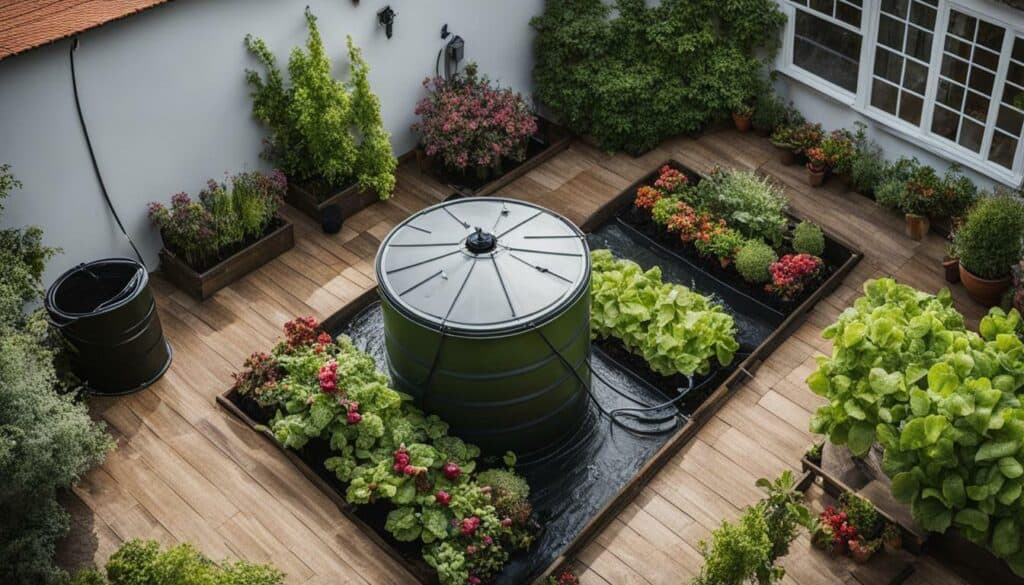
In addition to water conservation, reducing waste is another important principle of sustainable gardening. Composting is an excellent method to recycle kitchen scraps, garden waste, and fallen leaves. By turning these organic materials into nutrient-rich compost, you can enrich your soil naturally and reduce the amount of waste sent to landfill.
Finally, adopting eco-friendly practices in your UK garden can contribute to a sustainable lifestyle. Consider using organic fertilizers and pesticides that are free from harmful chemicals. These products are not only better for the environment but also promote healthier plants and a balanced ecosystem. Additionally, planting native species in your garden helps to support local wildlife and maintain biodiversity.
| Tip | Description |
|---|---|
| 1 | Collect rainwater using a water butt. |
| 2 | Compost kitchen scraps and garden waste. |
| 3 | Use organic fertilizers and pesticides. |
| 4 | Plant native species to support local wildlife. |
By implementing these sustainable gardening practices, we can create beautiful and thriving gardens while minimizing our impact on the environment. Let’s do our part to preserve the natural beauty of the UK and inspire others to embrace sustainable gardening.
UK Gardening Resources and Support
If you’re looking for additional support and resources to enhance your gardening journey in the UK, you’re in luck! In this section, I’ll share a comprehensive list of gardening resources, organizations, and online communities that offer valuable guidance and assistance to UK gardeners. Whether you’re a beginner or an experienced gardener, these resources will provide you with essential gardening knowledge, tips, and inspiration to help you achieve success.
Gardening Organizations
One of the best ways to connect with other gardeners and access expert advice is to join a gardening organization. In the UK, the Royal Horticultural Society (RHS) is a renowned organization that provides a wealth of resources for gardeners of all levels. They offer gardening courses, plant databases, and access to their botanical gardens. The RHS also organizes flower shows and provides a platform for gardeners to showcase their skills and learn from others.
Online Gardening Communities
Online gardening communities are a fantastic resource for connecting with like-minded individuals, sharing gardening tips and experiences, and seeking advice from seasoned gardeners. The Gardeners’ World forum, Gardening Advice on Reddit, and the Grow Your Own Magazine forum are popular online platforms where you can interact with other UK gardeners, ask questions, and receive valuable insights.
Educational Websites
When it comes to expanding your gardening knowledge, educational websites can be invaluable. The BBC’s Gardening website offers a wealth of information on various gardening topics, including plant care, garden design, and seasonal tips. The Gardening Which? website provides expert advice and consumer reviews on gardening products and tools, helping you make informed decisions for your gardening needs.
| Resource | Description |
|---|---|
| Royal Horticultural Society (RHS) | An organization that offers courses, plant databases, and access to botanical gardens |
| Gardeners’ World forum | An online platform for connecting with other gardeners, sharing tips, and seeking advice |
| Gardening Advice on Reddit | A subreddit dedicated to gardening discussions and advice |
| Grow Your Own Magazine forum | An online community for home gardeners, offering tips and support |
| BBC Gardening website | A comprehensive resource for gardening information, tips, and ideas |
| Gardening Which? website | An educational website that provides consumer reviews and expert advice on gardening products |
By tapping into these valuable resources, you’ll be equipped with the essential gardening knowledge, tips, and support needed to cultivate a thriving garden in the UK. Remember, gardening is a journey of continuous learning, so don’t hesitate to explore these resources and connect with fellow gardeners to expand your gardening horizons.
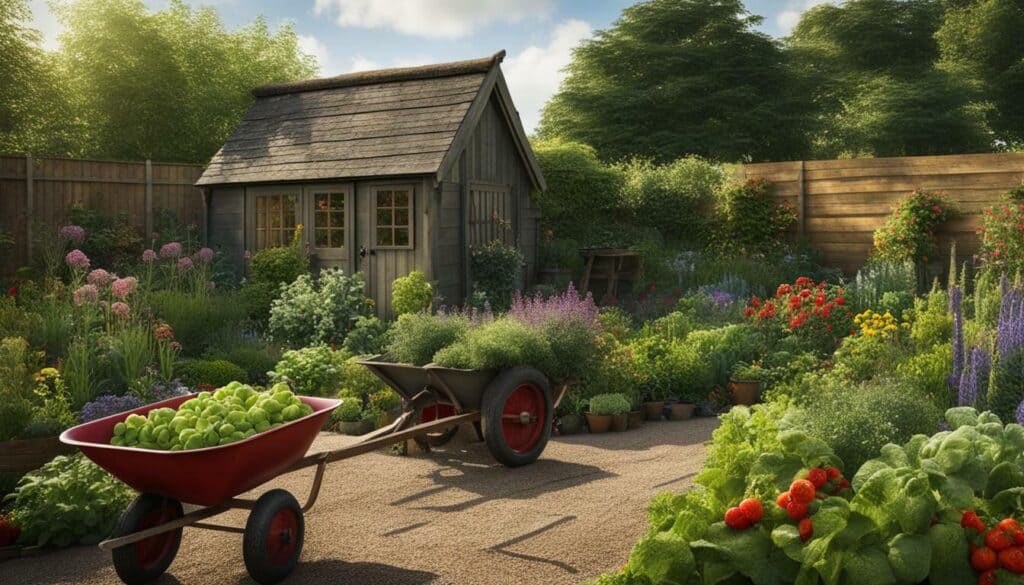
Conclusion
Congratulations! You’ve reached the end of this friendly guide on mastering gardening basics in the UK. By understanding the unique gardening climate, equipping yourself with the right tools and techniques, and seeking support from available resources, you’re well on your way to cultivating lush and vibrant gardens in the UK. Happy gardening!
Throughout this guide, we’ve explored the essentials of gardening in the UK, from understanding the climate to choosing the right plants and implementing sustainable practices. We’ve discussed the importance of soil preparation, the tools and equipment you’ll need, and the various techniques and practices specific to the UK.
Remember, gardening is a journey of learning and discovery. Don’t be afraid to experiment, make mistakes, and adapt your approach based on your unique gardening space and personal preferences. Take advantage of the wealth of resources and support available to you, whether it’s through local gardening communities, educational websites, or expert advice from Master Gardeners.
By nurturing your passion for gardening and continuously building your knowledge and skills, you’ll not only create beautiful and thriving gardens but also contribute to the well-being of your local community and the environment. So, grab your tools, put on your gardening gloves, and let your green thumb take you on an incredible gardening adventure in the UK!
Is the Gardening Guide for Beginners Suitable for UK Gardening?
The Gardening Guide for Beginners offers comprehensive easy gardening steps for beginners, making it suitable for UK gardening. With detailed instructions, it covers aspects like soil preparation, plant selection, and maintenance techniques specific to the UK climate. Whether you have a small balcony or a spacious backyard, this guide provides valuable insights to help you successfully embark on your gardening journey.
FAQ
Q: Can I use the title “Master Gardener” in my garden coaching business?
A: No, according to the University of Illinois Extension Master Gardener Coordinator, Master Gardeners are not allowed to use their title in any form of commercial advertisement.
Q: Why are Master Gardeners not allowed to use their title in commercial advertisements?
A: The University of Illinois Extension has this rule to maintain the integrity and credibility of the Master Gardener program. They want to ensure that the title is only used for educational and non-commercial purposes.
Q: What services do the Denton County Master Gardeners in Texas offer?
A: The Denton County Master Gardeners in Texas offer various services, including expert speakers for events, youth programs, support for community gardens, parks, and trails, and educational videos on gardening topics.
Q: What resources does the University of Minnesota Extension provide for gardeners?
A: The University of Minnesota Extension provides resources for Minnesota gardeners, including tips for solving plant problems, information on different types of plants, how-to guides on gardening practices, and news and events related to gardening.
Q: What topics are covered by the University of Minnesota Extension?
A: The University of Minnesota Extension covers a wide range of topics, including plant diseases, weed identification, flower and fruit growing, houseplants, native plants, trees and shrubs, vegetables, landscape design, lawn care, water conservation, and more.
Q: Are Master Gardeners in Minnesota available to offer advice and answer questions?
A: Yes, Master Gardeners in Minnesota are available to answer questions and provide gardening advice. They are dedicated to promoting healthy landscapes, healthy people, and a healthy planet.



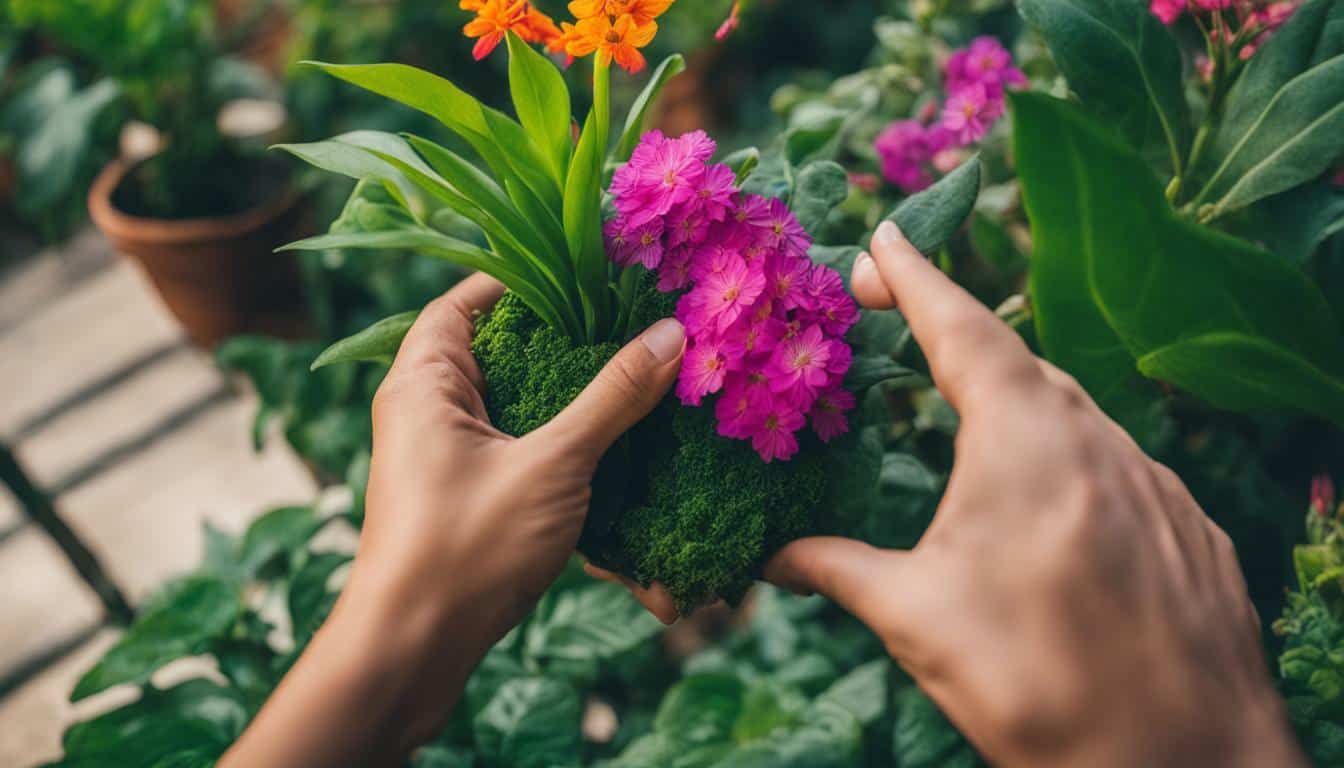
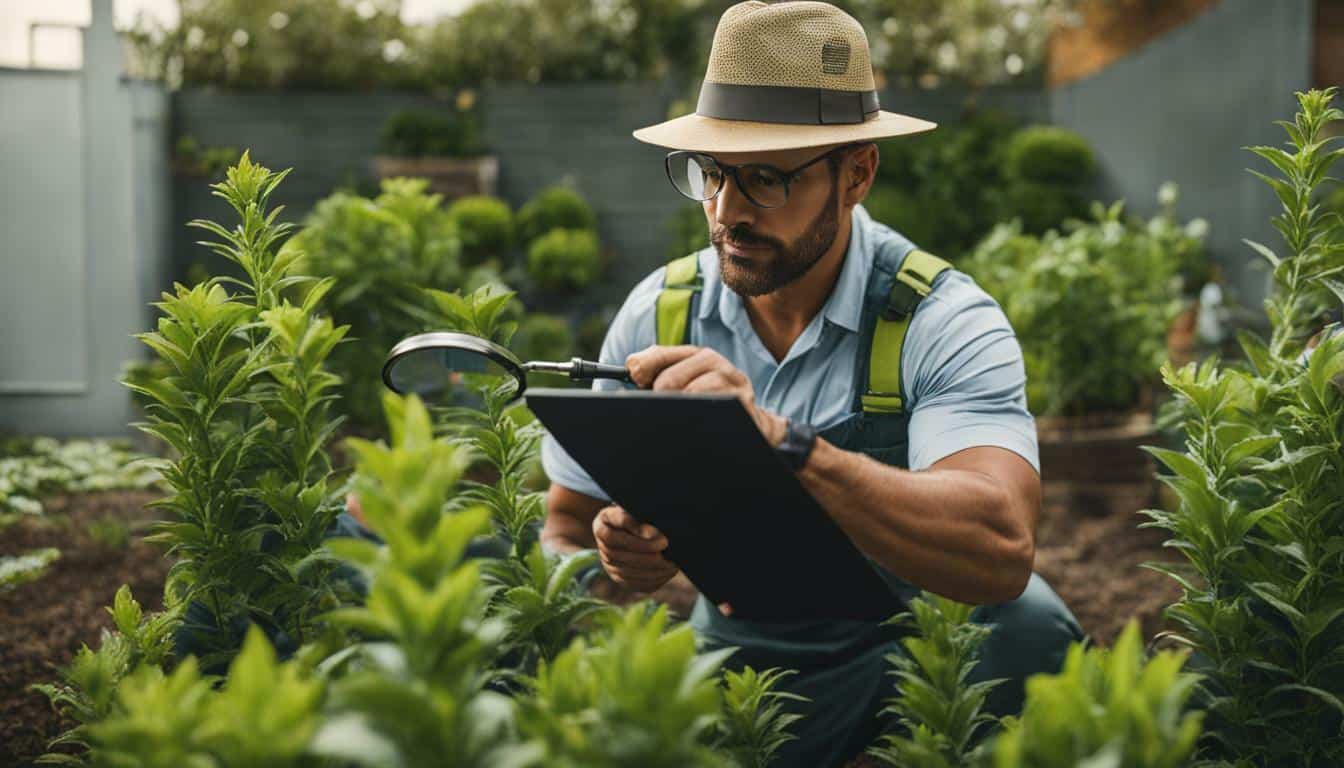

Leave a Reply